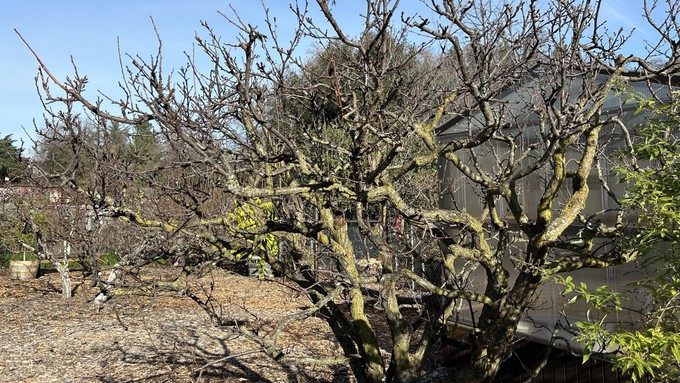
Sacramento and Placer groups welcome visitors to their demonstration gardens with free workshops

Orchards in January are pretty bare, but the Fair Oaks Horticulture Center's orchard will be busy this Saturday during Open Garden Day, 9 a.m. to noon. Bare-root demonstrations will be on tap beginning at 10 a.m. Kathy Morrison
Start the New Year right with expert advice – and plenty of gardening inspiration.
On Saturday, Jan. 11, UC master gardeners in two counties will host Open Garden Days at their demonstration gardens. Admission to both events is free; no registration necessary.
From 9 a.m. to noon, the Sacramento County master gardeners will invite visitors to watch them tackle January tasks at the Fair Oaks Horticulture Center. It’s an opportunity to ask questions while getting some hands-on training.
“Open Gardens are informal, free events where you roam the gardens, watch what we are doing, see what we are growing and ask questions,” say the master gardeners. “Bring samples of your problem plants, mystery pests and questions to the ‘Ask the Master Gardeners’ information table. Get one-on-one advice based on the most recent research-based sustainable practices.”
In addition, the master gardeners will offer two mini-talks. At 10 a.m., it’s “Bare-root Extravaganza.” “See demos on planting asparagus, fruit trees, cane berries, and landscape plants,” say the organizers. “Featuring a special soil mix for planting blueberries in containers.”
At 11 a.m., the master gardeners answer, “Where does it go? Organic waste bin or the compost pile?” Besides tips on sorting organic waste, get some composting advice, too.
Open Garden also is an opportunity to purchase a Sacramento County Master Gardeners’ 2025 Gardening Guide and Calendar with cash or check for only $12 including tax.
Fair Oaks Horticulture Center is located at 11549 Fair Oaks Blvd., Fair Oaks. All events are outdoors; no pets please.
Details: https://sacmg.ucanr.edu/
Also on Saturday, the Placer County Master Gardeners will host their Open Garden Day at their Demonstration Garden at the Loomis Library and Communication Center. They’ll be there from 10 a.m. to noon, answering questions as they tend their vegetables, flowers and perennials.
Inside the library, they’ll offer a free one-hour workshop – “Seed Saving Techniques: Select, Collect, to Sow and Grow.”
“Come learn the fundamentals involved in collecting, cleaning and storing seeds from your garden's plants, so you can grow them again in future seasons,” say the master gardeners. “This session will teach you how to select healthy plants, identify when to harvest seeds, proper seed cleaning methods and appropriate storage techniques to ensure seed viability for future seasons.”
And the Placer County master gardeners still have copies of their 2025 Gardening Guide and Calendar, “Healthy Garden, Healthy You.” Get your for $12 (including tax).
The demonstration garden is located on the grounds of the Loomis Library, 6050 Library Drive, Loomis.
Details: https://pcmg.ucanr.edu/
Comments
0 comments have been posted.Sacramento Digs Gardening to your inbox.
Food in My Back Yard Series
May 6: Maintain soil moisture with mulch for garden success
April 29: What's (already) wrong with my tomato plants?
April 22: Should you stock up on fertilizer? (Yes!)
April 15: Grow culinary herbs in containers
April 8: When to plant summer vegetables
April 1: Don't be fooled by these garden myths
March 25: Fertilizer tips: How to 'feed' your vegetables for healthy growth
March 18: Time to give vegetable seedlings some more space
March 11: Ways to win the fight against weeds
March 4: Potatoes from the garden
Feb. 25: Plant a fruit tree now -- for later
Feb. 18: How to squeeze more food into less space
Feb. 11: When to plant? Consider staggering your transplants
Feb. 4: Starting in seed starting
Sites We Like
Garden Checklist for week of May 4
Enjoy this spring weather – and get gardening!
* Plant, plant, plant! It’s prime planting season in the Sacramento area. Time to set out those tomato transplants along with peppers and eggplants. Pinch off any flowers on new transplants to make them concentrate on establishing roots instead of setting premature fruit.
* Direct-seed melons, cucumbers, summer squash, corn, radishes, pumpkins and annual herbs such as basil.
* Harvest cabbage, lettuce, peas and green onions.
* In the flower garden, direct-seed sunflowers, cosmos, salvia, zinnias, marigolds, celosia and asters. (You also can transplant seedlings for many of the same flowers.)
* Plant dahlia tubers. Other perennials to set out include verbena, coreopsis, coneflower and astilbe.
* Transplant petunias, marigolds and perennial flowers such as astilbe, columbine, coneflowers, coreopsis, dahlias, rudbeckia and verbena.
* Keep an eye out for slugs, snails, earwigs and aphids that want to dine on tender new growth.
* Feed summer bloomers with a balanced fertilizer.
* For continued bloom, cut off spent flowers on roses as well as other flowering plants.
* Add mulch to the garden to maintain moisture. Mulch also cuts down on weeds. But don’t let it mound around the stems or trunks of trees or shrubs. Leave about a 6-inch to 1-foot circle to avoid crown rot or other problems.